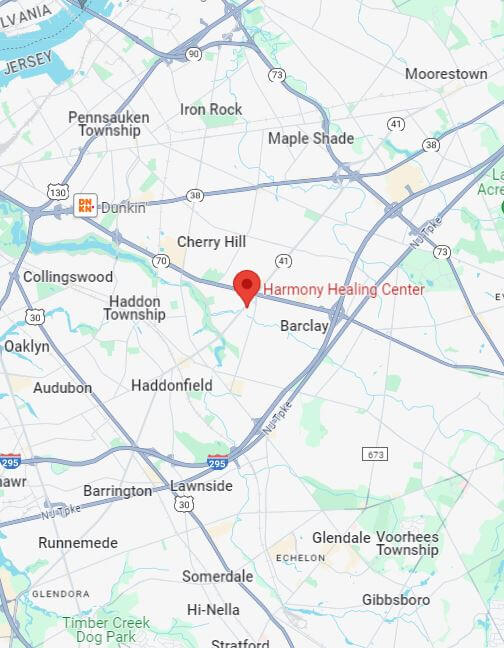Harmony Healing Center, nestled in Cherry Hill, New Jersey, specializes in comprehensive drug and alcohol rehabilitation and treatment. With a compassionate and experienced team at its helm, the rehab center provides a sanctuary where people can begin their addiction treatment journey with the resources and support they need to succeed.
At Harmony Healing Substance Addiction Treatment Center, we understand that each person’s path to recovery is unique. That’s why we offer personalized care and attention during addiction treatment. Rather than adhering to a one-size-fits-all approach, our rehab center prides itself on offering tailored rehabilitation programs that meet each patient’s needs and circumstances. While we don’t offer traditional residential or inpatient rehab, we offer a partial hospitalization program (PHP) complemented by housing options close to our facility. This gives patients the flexibility and resources required to treat their addiction while living in a supportive environment.
With a focus on holistic addiction treatment with individualized treatment modalities, Harmony Healing Addiction Treatment Center in New Jersey offers addiction treatment options to help guide people toward a brighter, substance-free future. For more information on our non-traditional residential treatment options, contact us online or call our rehab admissions team at (888) 409-5356 for assistance.
What Is a Residential Program for Drug and Alcohol Addiction Treatment?
A residential program, or inpatient program, for drug and alcohol addiction treatment typically involves a structured and immersive approach where individuals reside at a specialized facility for an extended period. Within this environment, patients receive intensive therapy, medical supervision, and support aimed at addressing the underlying causes of addiction.
Residential programs provide a highly supportive and controlled setting conducive to healing and recovery. These programs are successful because they provide treatment in a setting free from the triggers and distractions of everyday life so that individuals can focus entirely on their addiction treatment journey. Residential programs often offer a range of therapeutic modalities, including individual counseling, group therapy, behavioral therapies, and other holistic treatment approaches such as yoga and meditation. Moreover, round-the-clock medical supervision ensures immediate assistance in emergencies and helps patients manage withdrawal symptoms effectively.
The duration of residential programs varies depending on individual needs and the severity of addiction. Some programs may last a few weeks, while others extend to several months. Patients receive therapeutic interventions during their stay and acquire essential life skills and coping mechanisms to successfully navigate challenges post-treatment. Overall, residential programs provide a comprehensive and immersive approach to addiction treatment, offering individuals the support and resources necessary for achieving sustained sobriety and improved overall well-being.
Although we do not provide traditional residential or inpatient rehabilitation services, Harmony Healing Center in Cherry Hill, NJ, offers a partial hospitalization program (PHP), a supportive living environment, animal-assisted therapy and housing options at our rehab facility. This approach grants patients the flexibility and support needed to address their addiction effectively while residing in a supportive environment. For further details regarding the non-traditional residential treatment options at Harmony Healing, you can contact us at (888) 409-5356.
How Does an Addiction Treatment PHP with Housing Compare with an Inpatient Residential Program?
Contact Us for a Free Assessment
Are you ready to turn the page and begin a new chapter in your story? We have the tools you need to transform your life. Let’s talk about what’s next.

Do Residential Facilities Offer Treatment for Drug and Alcohol Addiction?
Yes, residential facilities typically offer comprehensive treatment programs for drug and alcohol addiction. Residential mental health programs and facilities provide a structured environment where patients can receive intensive therapy, medical supervision, and support aimed at treating the causes of addiction and facilitating lasting recovery and sobriety.
Residential addiction programs often involve a combination of individual counseling, group therapy, behavioral therapies, and holistic approaches to address various aspects of addiction. Additionally, these rehab facilities may offer specialized addiction treatment programs tailored to specific demographics or types of addiction, ensuring that individuals receive personalized care that meets their unique needs. With 24/7 care and supervision, residential facilities provide a safe and supportive environment for people to better focus on their recovery journey, free from the triggers and distractions of everyday life.
While we do not offer conventional residential recovery options or inpatient facilities, Harmony Healing Center does offer a partial hospitalization program (PHP) complemented by long-term residential care housing options at our rehabilitation facility. This integrated approach offers patients the flexibility and a supportive environment to focus on full-time recovery. For more information on Harmony Healing’s non-traditional residential treatment options, contact us at (888) 409-5356.
What Is Treated at Substance Abuse Programs in Residential Treatment Facilities?
Substance abuse programs offered in residential treatment facilities cater to a wide spectrum of addiction disorders, addressing various substances and their associated dependencies. The examples below represent a glimpse into the comprehensive care provided at residential treatment facilities, as these facilities tailor treatment plans to meet individual needs.
From alcohol use disorder to opioid dependency and cocaine addiction, intensive residential therapy programs offer specialized interventions aimed at promoting lasting recovery and holistic well-being.
Residential Treatment for Alcohol Use Disorder
Residential treatment for alcohol use disorder (AUD) provides a structured living approach to address the complexities of alcohol addiction. Holistic residential treatment programs typically begin with a free assessment to determine the severity of the disorder and develop a personalized treatment plan tailored to the individual’s needs.
Within a recovery residence setting, individuals receive round-the-clock care and support, including medical detoxification if necessary to manage withdrawal symptoms safely. Therapy sessions, both individual and group, are central components of treatment, focusing on addressing underlying psychological factors contributing to alcohol dependency, developing coping skills, and preventing relapse. Additionally, residential therapy programs often integrate holistic approaches such as mindfulness practices, nutritional counseling, and fitness activities to promote overall wellness and recovery from AUD. Through a combination of therapeutic interventions and a supportive, therapeutic community, residential treatment for Alcohol Use Disorder aims to empower patients to reclaim control over their lives and achieve lasting sobriety.
Residential Treatment for Opioid (Heroin, Fentanyl, Prescription Painkillers) Use Disorder
Residential treatment for opioid use disorder (OUD) offers specialized care to individuals grappling with dependencies on opioids such as heroin, fentanyl, or prescription painkillers. In-house rehabilitation programs typically begin with a comprehensive free assessment to evaluate the extent of the addiction and tailor a treatment plan accordingly.
In residential substance abuse treatment, patients receive intensive medical and psychological support, including medically supervised detoxification to manage withdrawal symptoms safely. Therapy sessions, both individual and group, play a pivotal role in residential treatment for OUD, as they address the underlying psychological issues, teach coping strategies, and foster relapse prevention. Additionally, medication-assisted treatment (MAT) may be incorporated to alleviate cravings and stabilize individuals’ physiological responses to opioids.
Furthermore, residential programs often provide education on opioid addiction, life skills training, and support for family members to facilitate a supportive environment for recovery. By offering a comprehensive array of services within a structured and supportive environment, a residential rehabilitation center aims to empower patients to overcome their opioid addiction and rebuild their lives free from the grip of drugs.
Residential Treatment for Cocaine (Coke and Crack) Use Disorder
Residential treatment for cocaine use disorder (CUD) offers tailored interventions to address the unique challenges posed by dependencies on cocaine, including both powder (coke) and crack forms. These programs typically begin with a free assessment to evaluate the individual’s addiction severity and design a personalized addiction treatment plan.
Within a residential setting, individuals receive comprehensive in-residence addiction treatment, including medically supervised detoxification to manage withdrawal symptoms safely. Therapy sessions, both individual and group, are fundamental components of residential treatment for CUD, focusing on identifying and addressing underlying psychological factors contributing to addiction, teaching coping mechanisms, and preventing relapse. Additionally, cognitive-behavioral therapy (CBT), motivational interviewing, and alternative therapies may be employed to address cravings, triggers, and co-occurring mental health issues.
Moreover, residential programs often incorporate life skills training, vocational assistance, and aftercare planning to support individuals in their transition to life after treatment. By providing a structured and supportive environment along with evidence-based interventions, residential treatment for Cocaine Use Disorder aims to empower individuals to overcome their crack cocaine addiction.
Do Residential Rehabs Have Treatment for Dual Diagnosis?
Yes, rehab facilities often provide residential dual diagnosis treatment, which refers to the co-occurrence of substance use disorder and mental health issues. These facilities offer integrated care that addresses both addiction and underlying psychiatric conditions simultaneously.
Individuals with dual diagnosis usually receive a comprehensive free assessment to identify and address both substance abuse and mental health concerns. Residential treatment plans typically include a combination of therapies such as medication management, individual counseling, group therapy, and other holistic addiction treatment approaches tailored to meet the needs of each patient. Additionally, specialized programs may focus on specific dual diagnosis combinations, ensuring targeted interventions for effective recovery.
At Harmony Healing Drug and Alcohol Addiction Treatment Center, we aim to address both addiction and mental health issues concurrently through our unique PHP program combined with onsite residence. To learn more about our residential rehab options for dual diagnosis treatment, contact us online or call our rehab admissions team at (888) 409-5356.
Long-Term Residential Treatment Facility in New Jersey
Long-term residential rehab facilities in New Jersey offer comprehensive treatment programs tailored to individuals seeking sustained sobriety and holistic healing. While the subsequent sections provide examples of various residential treatment durations, it’s essential to recognize that these listings serve as samples rather than an exhaustive list.

From 60-day to multi-year residential treatment programs, each option provides a unique approach to addressing substance use disorders and caters to the diverse needs and circumstances of patients.
NJ 60-Day Residential Treatment
NJ 90-Day Residential Treatment
NJ Six-Month to Two-Year Residential Treatment
Short-Term Residential Treatment Facility in New Jersey
In New Jersey, short-term residential treatment facilities offer a focused and intensive approach to rehabilitation for individuals seeking recovery from substance use disorders. The subsequent sections provide examples of various short-term residential treatment durations, emphasizing that these listings serve as samples rather than an exhaustive compilation.
From 30-day to weekend programs, each option provides a unique opportunity for individuals to receive structured care and support tailored to their needs within a condensed time frame, so they can get back to their New Jersey lifestyle faster.
NJ 30-Day Residential Treatment
NJ 21-Day Residential Treatment
NJ 14-Day Residential Treatment
NJ Seven-Day Residential Treatment
NJ Weekend Residential Treatment

Does Health Insurance Cover Residential Treatment Programs for Drug and Alcohol Addiction?
Yes, health insurance often covers residential treatment programs for drug and alcohol addiction, but coverage can vary depending on the individual’s insurance plan and provider. Many insurance plans include provisions for substance abuse treatment, including residential programs, as part of their mental health and addiction services.
However, the extent of insurance coverage for residential treatment, including deductibles, co-pays, and limitations on the duration of treatment, differs based on the specific plan and provider. Health insurance coverage for residential treatment programs typically falls under behavioral health or mental health benefits. These benefits may encompass various services, including detoxification, inpatient treatment, outpatient treatment, therapy sessions, and medication management.
Individuals must review their insurance policies carefully and understand the specifics of their coverage related to substance abuse treatment. At Harmony Healing Addiction Treatment Center, we help you verify your insurance coverage and navigate the lengthy process to ensure you receive the maximum coverage available for residential addiction treatment.

Harmony Health Center – Cherry Hill, New Jersey
401 Kings Highway South
Building #1 Tara Corporate Park
Cherry Hill, NJ 08034
How to Find Residential Treatment Facilities In New Jersey
Harmony Healing Addiction Treatment Center specializes in comprehensive addiction treatment. We offer a range of comprehensive treatment programs to support patients on their journey to recovery from substance abuse.
The treatment programs offered at Harmony Healing include a partial hospitalization program (PHP) with housing, an intensive outpatient program (IOP), medication-assisted treatment (MAT), and general outpatient treatment services. Our outpatient rehabilitation treatment program integrates evidence-based addiction treatment and holistic treatment approaches to address addiction comprehensively. We are currently accepting new patients and provide residential housing options for those in need of a sober living community during their outpatient rehab treatment.
If you or someone you know is ready to take the first step in the addiction treatment process, we encourage you to call us at (888) 409-5356 or fill out the insurance verification to get started. Our dedicated rehab admissions team is here to help you start your recovery journey.
Locating Residential Rehab Facilities
What Is the Addiction Residential Treatment Admissions Process?
The admission process for addiction residential treatment aims to provide individuals with mental health or substance use concerning the necessary care and support throughout their participation in the program. Although procedures may vary among treatment centers, here’s a general outline of what to anticipate:
- Initial Contact: This stage involves reaching out to the treatment center, either through a phone call, email, or online inquiry form. During this initial contact, individuals may provide basic information about themselves and express their interest in seeking treatment.
- Assessment and Evaluation: Upon initial contact, individuals undergo a free assessment and evaluation process. This typically includes interviews, questionnaires, and medical examinations to gather information about their medical history, substance use patterns, mental health status, and treatment goals.
- Insurance Verification: After the assessment, the treatment center coordinates with the individual’s insurance provider to verify insurance coverage for residential treatment services. This involves confirming benefits, determining any out-of-pocket expenses, and understanding coverage limitations.
- Addiction Treatment Plan Development: A personalized treatment plan is developed for each person based on the free assessment results and insurance coverage. This plan outlines the specific interventions, therapies, and goals tailored to their unique needs and circumstances.
- Admissions Coordination: Once the treatment plan is finalized, the rehab admissions team coordinates the admission logistics. This may include arranging transportation to the facility, coordinating intake paperwork, and scheduling the admission date.
- Orientation and Program Introduction: Upon arrival at the addiction treatment center, individuals receive an orientation and introduction to the program. This includes familiarizing them with the facility, meeting staff members, reviewing rules and expectations, and understanding the daily schedule.
- Active Participation in Treatment: Throughout their stay, individuals actively participate in various components of the treatment program, including individual therapy, group therapy, educational sessions, and recreational activities. They engage in therapeutic interventions aimed at addressing underlying issues and promoting recovery.
- Progress Monitoring and Adjustments: Progress is monitored regularly by the treatment team, and adjustments to the treatment plan are made as needed.
The addiction residential treatment admissions process is a comprehensive and structured process designed to ensure individuals receive the support and care they need to overcome mental health or substance use concerns. From the initial contact to active participation in treatment and ongoing progress monitoring, each step is crucial in facilitating a successful recovery journey. By working closely with treatment professionals, individuals can embark on a path towards healing, empowerment, and lasting sobriety within a supportive residential treatment environment.
Although traditional residential recovery options or inpatient facilities are not provided at Harmony Healing Treatment Center, we do offer a partial hospitalization program (PHP) supplemented by long-term residential care housing options to meet your rehab needs. This integrated approach provides patients with the flexibility and supportive environment required to dedicate themselves fully to recovery. For further details on Harmony Healing’s alternative residential treatment program, you can contact us online or call (888) 409-5356 for help.
What Is a Typical Daily Schedule at a Residential Treatment Center?
A typical daily schedule at a residential treatment center is structured to provide a balance of therapeutic activities, individualized treatment sessions, recreational opportunities, and downtime for rest and reflection. Mornings often begin with a healthy breakfast followed by group therapy sessions, where residents can share experiences, discuss progress, and receive support from peers and therapists.
Throughout the day, participants engage in various therapeutic modalities such as individual counseling sessions, behavioral therapy, psychoeducation classes, and alternative therapies such as art therapy or yoga. These sessions help address underlying issues related to addiction, promote personal growth, and develop better coping skills. Additionally, residents participate in recreational activities and wellness practices to promote physical health and emotional well-being. Evenings typically involve relaxation activities, such as mindfulness exercises or leisure time, allowing residents to unwind and reflect on their progress before retiring for the night.
How Much Does a Residential Rehab Program Cost?
The cost of a residential rehab program varies depending on the location of the treatment center, rehab facility amenities, the duration of rehab, and the level of treatment provided. On average, residential rehab programs can range from $10,000 to $50,000 per month. However, luxury facilities or programs offering specialized services may exceed this range.
Additional factors influencing the cost of a residential rehab program include the types of therapies offered, the credentials and expertise of staff members, the facility’s reputation, and whether additional services such as detoxification or medical care are included. It’s essential for individuals considering residential rehab to inquire about all potential costs upfront and explore all their options for financial assistance. Often, financial assistance for residential rehab programs includes options such as insurance coverage, sliding scale fees, or scholarships. Additionally, some residential rehab facilities may offer payment plans or other financing options to help manage the cost of addiction treatment.
Harmony Healing Addiction Treatment Center in New Jersey prioritizes holistic addiction treatment through rehab treatment programs. We provide tailored treatment approaches to guide individuals towards a substance-free future. To learn more about our cost effective and non-traditional residential treatment options, you can contact us online or reach out to our dedicated rehab admissions team at (888) 409-5356 for assistance.
Related Addiction and Mental Health Programs at Harmony Healing New Jersey
Statistics on Substance Abuse Residential Programs in New Jersey
In New Jersey, the demand for residential treatment for substance use disorders (SUDs) remains significant. According to recent statistics, approximately 85,000 individuals seek admission into residential treatment programs across the state annually, according to data from the 2022 Statewide Substance Use Overview.
Nationally, the trend mirrors this need, with an estimated 58 million people seeking some sort of addiction treatment for substance abuse-related issues in 2021, according to the National Survey on Drug Use and Health report. The same report found that approximately 61.2 million people over the age of 12, which represents 21.9 percent of the national population, reported using illicit drugs within the past year. Among young adults between 18 and 25, nearly 2 in 5 people admitted to using illicit drugs in the previous year, with 1 in 3 reporting marijuana consumption during the same period.
Additional statistics reveal that in 2021, a staggering 94% of individuals aged 12 or older did not receive any form of treatment for their substance use disorder. Remarkably, the vast majority of those with a substance use disorder who refrained from seeking treatment at specialized facilities cited a lack of perceived need for intervention, according to the survey. These findings underscore the critical importance of raising awareness and enhancing accessibility to comprehensive treatment options to address substance use disorders effectively and mitigate the associated societal and individual harms.
These statistics underscore the widespread prevalence of substance use disorders and the necessity for comprehensive treatment options to address this public health concern effectively. Furthermore, live-in treatment facilities also cater to individuals facing mental health disorders in addition to substance use disorders.
Contact Harmony Healing Center
Get personalized help from an empathetic professional.
